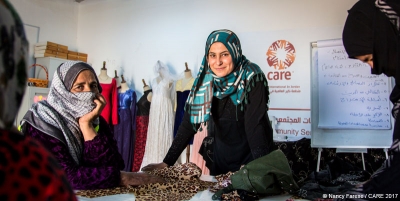What did we accomplish?
- Built social solidarity: 84% of participants said the programme changed their lives for the better because it allowed them to meet new people and learn new cultures. Women especially said they built friendships with other people in their class and were able to work together to solve their problems.
- Influenced gender equality: 92% of people said the training contributed to gender equality in the household because women were more confident and empowered.
- Improved incomes: 42% of people who took part in vocational training said they were able to use their new skills to access more income opportunities after the training.
- Built skills: 90% of people thought the trainings were helpful, and 87% said they learned new skills.
How did we get there?
- Bring communities together: The project works with both refugees and host community members. This is especially important because Syrians now make up 13% of the population in Jordan, and are putting stress on local markets.
- Work with the local market: The project conducted an assessment to figure out which skills were most marketable in the areas where it works, and targets skills that are in demand so increase the chances of getting a job after. Cooking has been the most popular class so far.
- Support start-up: After training, some people got materials to help start their businesses—like sewing machines for women in those classes.
- Work with local partners: CARE trained local NGOs not only in the vocational skills, but also in areas like leadership, grants and finance, and stress management.
During 2016, Jordan’s urban protection response programme reached 2,799 direct beneficiaries—both refugees and Jordanian host community—with vocational trainings. These activities came from a collection of projects that make up the urban protection response with generous funding from the US Government (PRM), Global Affairs Canada, and DFID.
Want to learn more?
Check out the impact assessment from 2017.




